Funny Labels in China
There's a lot of funny labels on products in China. Sometimes it's
a cultural thing but often it's just because of bad English. You see,
China is very keen on
learning English and using English. All the students study it at all
levels of
school. English has been trendy for decades now, since it is
known to be the international language of business, science, and so on.
I have other pages showing funny English on
signs, but on this page I
thought I'd show some of the strangely worded English commonly seen in
China on labels and clothing.
My first picture is actually a whole funny
shirt. Just because China is keen on using English doesn't mean
everybody can recognize when it's done well. Consider the text on this
woman's shirt I found for sale. (Unfortunately, for more than one
reason, somebody actually bought this before I decided to.)
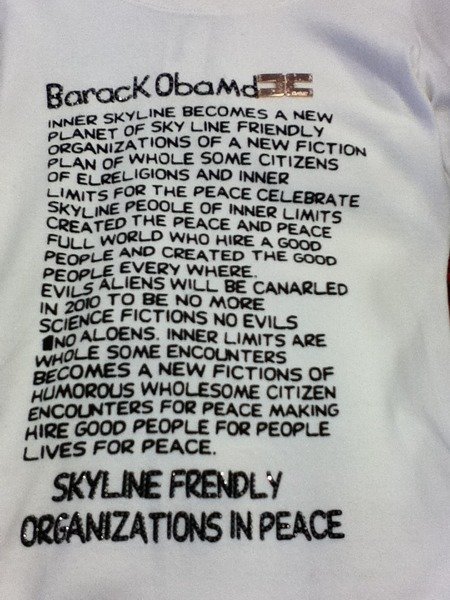
Don't you feel much safer now that you know "Evils aliens will be canarled"?
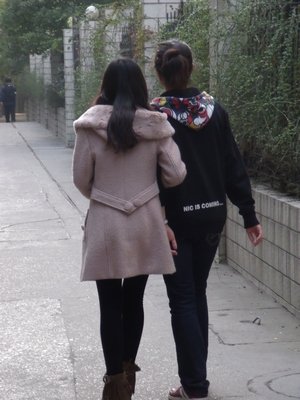
In the photo above you
see one of the more strangely named brands of clothing in China: "Nic
is
Coming". Li Chen, a host on China's version of MTV, started this line
fairly recently. I've never heard an explanation of the choice of name,
but it seems strange to see it plastered across a young women's behind.
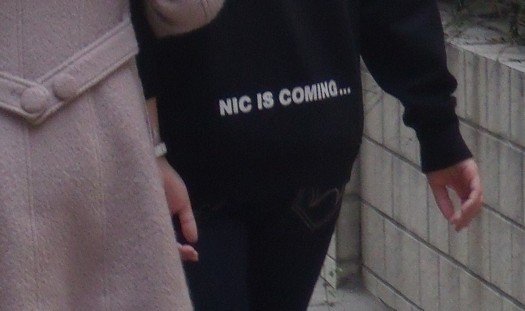
On the other hand, I've also seen a slim young woman wearing pants with "BUFFALO" in big capital letters across the rear, and another reasonably friendly looking young woman wearing a shirt that said "ANGRY PIG" on the front. Another one had a green shirt that boldly proclaimed "THINK GREED" (yes, with a "D"). Quality rejects from the export companies still have a good market in China.
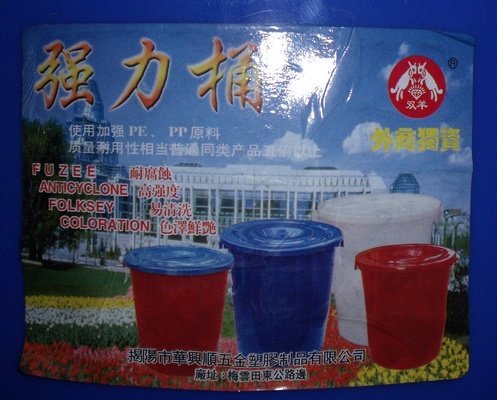
There are funny labels on all sorts of products in China. As you can
see here,
this one is for a plastic garbage can. It's hard enough to believe that
the can is "folksey" (aw shucks... we all spell it with an extra "e"
around here) but protection against a cyclone?
Can't you just picture it? "Look! A hurricane! Into the coloration
plastic cans everyone! You'll be safe there!"
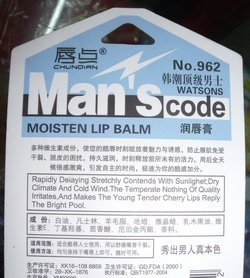
I'm actually using this
stuff, 'cause I'm a Man. It smells like I'm putting varsol on my lips
but it seems to do a good job at preventing chapping. As you can see
from the magnified view of the label below, it claims a lot more... if
you can actually figure out what it's claiming. Is it promising
"nothing of quality"? Is it actually desirable that my "cherry lips
reply the bright pool"?

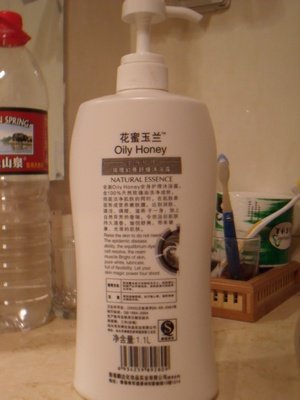
In 2009, my wife and I stayed a
day or two at a Hutong Inn in Beijing.
Skin lotion and hair conditioner
was
supplied with the room. This is the skin lotion. I'm sure many of the
guests are wildly
enthusiastic about slathering "Oily Honey" onto themselves. One is
sticky; the other slimy. Doesn't it make sense that together they'd be
ideal for skin?
Anyway, the really
interesting part is the English on the label, shown magnified below.
Apparently, one of the selling points is the fact that you can apply
this with your skin in place - you do not need to raise your skin to
the lotion; you can take the lotion to the skin! What an innovation!
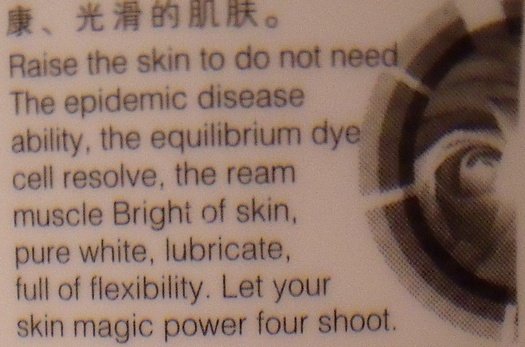
Or maybe I'm parsing that wrongly. Perhaps the "raise" part goes with what is after "The" -- so it means your skin will be raised to such a level of health that you will not need "epidemic disease ability". I'm not sure what a "ream muscle" is.
But, of course, everybody wants to "let your skin magic power four shoot". How else would you power four shoot?
How do companies get
such bad English funny labels? My guess is that they just used some
online translation and didn't have the English level to check whether
or not it made any sense. Gives you a lot of confidence in computer
language translation, don't it?
The Hutong Inn bathroom
was also supplied with hair conditioner. Here, at least the adjectives
make sense in the context of hair. Who would not want a "great soft
slippery healthy appearance"? But what's with the "fluently slippery"?
That sounds like a description of a used car salesman.
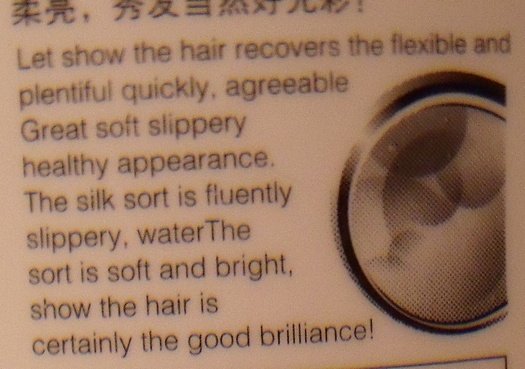
Recently, needing a pair of black jeans or something similar, I went to a store that sold all men's clothing of the "LADY ECHO" brand. At least that's what I thought it said. On closer inspection I realized the O was an E, so it was "LADY ECHE"?
Anyway, the pants were what I wanted and my size, so I bought them. As I completed the transaction I looked more closely at the brand/logo. The logo was an old car and "1885", which looked like about the year of the car. Then I realized the name was "LAO YE CHE"...
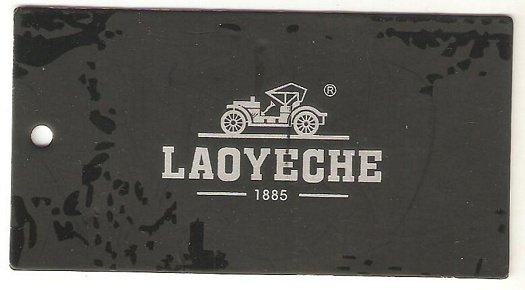
In the Chinese language, any syllable has multiple meanings. There
can be dozens of possible meanings. Knowing the tone narrows down the
list but we don't have that here. Even if we know the intended tone, we
need to look at the context of the syllable to choose the meaning. As
you can guess, puns aren't as funny in Chinese because ambiguity is the
norm.
On this funny label we don't have the tones but have the picture and
date for
context. CHE means vehicle (car, train, wagon, etc.).
YE probably refers to "yeye", which means grandfather. LAO means
old/respected. As near as I can figure, my new pants are
"respected old grandfather car" brand. There's a catchy brand name!
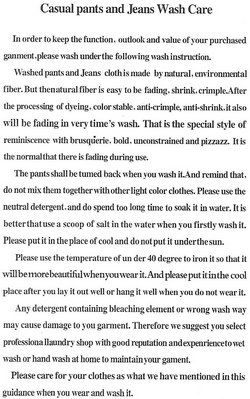
(By the way, I was 51 and my only child was 15 years old when I
bought the pants... I'm glad there was no qualification check required.)
With the pants came
washing instructions, which don't exactly belong in a funny labels
collection but let it go, eh? To the left, you see the complete tag.
Below is a close-up photo of the most
interesting English on it.
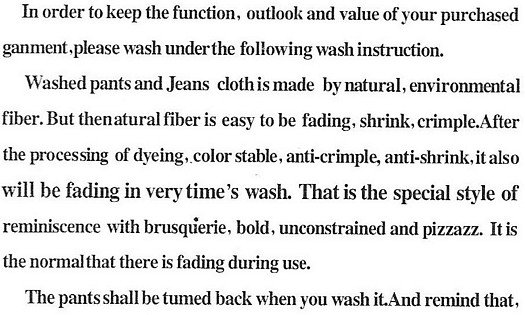
The "anti-crimple"
feature and the "style of reminiscence with brusquerie and pizzazz"
just make me want to rush out and buy another pair! I
should "remind that".
Even before computer translation, there were lots of funny labels on products in China. In the early 1990s I found some underarm deodorant (quite rare in those days!) that promised young men who used it would marry a lovely girl. And you could buy toothpaste that features "SOD"!
Shopping in China had and still has some unexpectedly amusing
aspects to
it, like funny labels.